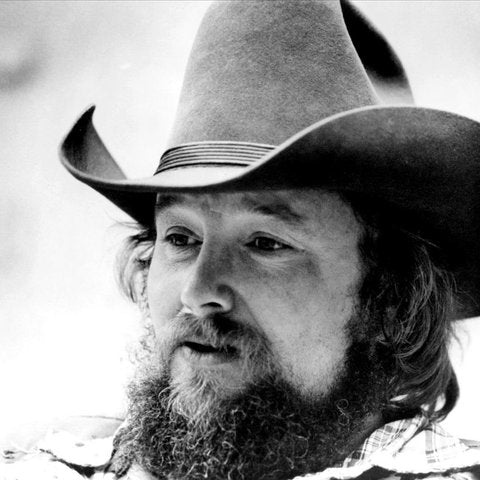This month we bring you the fifth volume of our Charlie Daniels trilogy series featuring the albums Powder Keg, Homesick Heroes and Simple Man. Best known for his number one country hit "The Devil Went Down to Georgia" Daniels has been active as a singer and musician since the 1950s.
Having relocated to Nashville in the sixties Daniels found his fiddle playing skills much in-demand; he leant his instrumental talents to albums such as Bob Dylan’s Nashville Skyline, Self Portrait and New Morning, and even the Ringo Starr solo album Beaucoups of Blues. Canadian National Treasure Leonard Cohen recruited Daniels for his late ‘60s touring band, and Daniels found himself in the production chair for the Youngbloods classic, Elephant Mountain.
Then in 1970 Daniels released his self-titled debut album for Capitol Records and by 1972, he’d formed his own band, and his frequent touring, good-time ambience and unrepentant Southern attitude endeared himself to the burgeoning Southern Rock audience. His music blended country fiddle playing, hard-rocking guitar, a bit of Blues, Texas Swing and dazzling instrumental interplay to impressive effect, and, in not very much time, his hard work started to pay dividends.
As the seventies progressed, Daniels was able to navigate assuredly the Southern Rock wave, and with his single, ‘The South’s Gonna Do It Again’, cannily gave name checks to many of his Southern contemporaries, including Grinderswitch, Marshall-Tucker Band, ZZ Top, Wet Willie Band, Barefoot Jerry, et al. Although the Southern Rock phenomenon had burned itself out by the latter part of the decade, he nonetheless prevailed, by dint of strong record company support from Epic Records, and his ‘Volunteer Jam’ jamborees based in Nashville, which became hugely popular events – in 2015, he celebrated the fortieth anniversary of the shows.
A solid regimen of albums and touring kept Daniels and his band busy throughout the eighties, and by the time of Powder Keg (released in January, 1987), he and his band were a long-established feature on the US recording and touring scene. Charlie Daniels was adept on guitar, fiddle, banjo and mandolin, and probably more. He’s Southern born and raised, and his opinions are robust, and he makes little apology for his assertion of those values. However, as a musician, his reputation is founded on a love of The Blues, hillbilly country, Western Swing, and old-time rock and roll. His music draws on those influences and more besides. Powder Keg is a master class in showcasing those musical values.
Powder Keg features the core CDB of Charlie Hayward (bass), Jack Gavin (drums) Tom Crain (guitar), Taz DiGregorio (keyboards), in addition to Daniels own fiddle, guitar, mandolin and lead vocals, with help from additional horn players Dewey Dorough, George Tidwell, Jim Horn, Michael Haynes, and Dennis Quitman. Most of the content is composed by the Charlie Daniels Band as a unit, and it gives the album a real sense of collective purpose. Powder Keg nails its colours to the mast from the sleeve on in – a Gibson Les Paul guitar connected to a powder keg of the title, and what you get is the time-honoured blend of shit-kicking Country Rock workouts, plaintive balladry and Daniels semi-spoken narrative outings.
Moving on to Homesick Heroes, the album opens with “Boogie Woogie Fiddle Country Blues” a bracing, infectious rocker that makes reference to the kind of music that gets Daniels’ pulse racing. Featuring some fine fiddle soloing, as well as some terrific unison riffing, it’s a raunchy opening number. And starting with a bass guitar run, “Alligator” is an amusing Daniels narrative, and a great example of Daniels’ ability to tell a story in song. He also offers up a cover of the Jimmy Dean hit, “Big Bad John”, reworked in atmospheric fashion with blues-tinged acoustic guitar. “You Can’t Pick Cotton” is a rambunctious fiddle sawing exercise, and he revisits his early hit, “Uneasy Rider” by relocating it to a Louisiana Gay Bar!
Simple Man kicks off with “(What This World Needs Is) A Few More Rednecks” which is as near as you’ll get to Charlie Daniels’ personal ethos. With a (disparaging) reference to the Russian then-premier, Mikhail Gorbachev, an anti-Gun Control line, and a sound kicking addressed to out-of-touch politicians, that’s Daniels in a nutshell. “Play Me Some Fiddle”, as the title suggests, is a raucous stomper which features Daniels’ sizzling violin work. And “Simple Man” is Daniels in vengeful mood. It’s laced with Biblical imagery, and is lyrically not for the Liberal or faint-hearted! As a statement of his beliefs, it is blunt and unapologetic.
There you have it – three albums which showcase the multifarious talents of the Charlie Daniels Band.
With thanks to Alan Robinson

